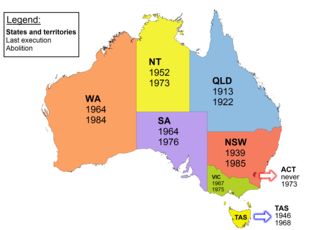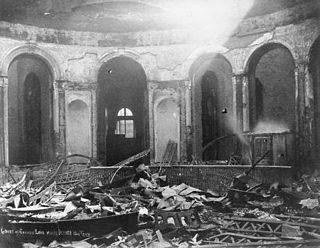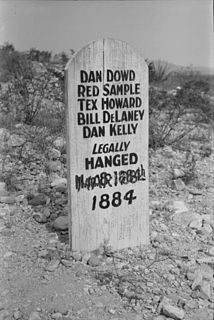
Nodaway County is a county located in the northwest part of Missouri. As of the 2010 census, the population was 23,370. Its county seat is Maryville. The county was organized February 14, 1845 and is named for the Nodaway River. It is the largest in area of the counties added to Missouri in the 1836 Platte Purchase and the fourth-largest county in Missouri.

The historic Town of Fairplay is the Statutory Town that is the county seat and the most populous municipality of Park County, Colorado, United States. The town population was 724 at the 2020 United States Census. Fairplay is located in South Park at an elevation of 9,953 feet (3,034 m). The town is the fifth-highest incorporated place in the State of Colorado. Fairplay is now a part of the Denver–Aurora–Lakewood, CO Metropolitan Statistical Area and the Front Range Urban Corridor.
In criminal law, diminished responsibility is a potential defense by excuse by which defendants argue that although they broke the law, they should not be held fully criminally liable for doing so, as their mental functions were "diminished" or impaired.

Edgar Ray Killen was an American Ku Klux Klan organizer who planned and directed the murders of James Chaney, Andrew Goodman, and Michael Schwerner, three civil rights activists participating in the Freedom Summer of 1964. He was found guilty in state court of three counts of manslaughter on June 21, 2005, the forty-first anniversary of the crime, and sentenced to 60 years in prison. He appealed the verdict, but the sentence was upheld on April 12, 2007, by the Supreme Court of Mississippi. He died in prison on January 11, 2018, six days before his 93rd birthday.

South Park City is an open-air museum located at the west end of Front Street in the town of Fairplay in Park County, Colorado. Open from May 15 through October 15, the museum is a historic reconstruction of a mining town from the days of the Colorado Gold Rush and the later Colorado Silver Boom in South Park in the late 1850s through the 1880s.

Como is an unincorporated community in Park County in the Rocky Mountains of central Colorado, United States. According to the 2010 census, the population of zip code 80432 is 439, including surrounding subdivisions in a 15 mile radius. Metropolitan Como proper usually has a population of 12 to 15 residents, within the Como plat.

Thomas Mead Bowen was a state legislator in Iowa and Colorado, a Union Army officer during the American Civil War, a justice of the Arkansas Supreme Court, briefly the Governor of Idaho Territory, an elected judge in Colorado and a United States senator from Colorado.
Roy Belton was a 19-year-old white man arrested in Tulsa, Oklahoma with a female accomplice for the August 21, 1920 hijacking and shooting of a white man, local taxi driver Homer Nida. He was taken from the county jail by a group of armed men, after a confrontation with the sheriff, and taken to an isolated area where he was lynched.

Albert Wills McIntire was an American Republican politician. He was the ninth Governor of Colorado from 1895 to 1897. In 1896 Governor McIntire sent the Colorado National Guard to Leadville due to violence at the Coronado Mine during a strike by the Western Federation of Miners.

Capital punishment in Australia was a form of punishment in Australia that has been abolished in all jurisdictions. Queensland abolished the death penalty in 1922. Tasmania did the same in 1968. The Commonwealth abolished the death penalty in 1973, with application also in the Australian Capital Territory and the Northern Territory. Victoria did so in 1975, South Australia in 1976, and Western Australia in 1984. New South Wales abolished the death penalty for murder in 1955, and for all crimes in 1985. In 2010, the Commonwealth Parliament passed legislation prohibiting the re-establishment of capital punishment by any state or territory. Australian law prohibits the extradition or deportation of a prisoner to another jurisdiction if they could be sentenced to death for any crime.
Gold mining in Colorado, a state of the United States, has been an industry since 1858. It also played a key role in the establishment of the state of Colorado.

Oro City, now a ghost town, was an early Colorado gold placer mining town located near Leadville in the California Gulch. Oro is the Spanish word for gold. Oro City was the site of one of the single richest placer gold strikes in Colorado, with estimated gold production of 120,000 to 150,000 troy ounces, worth $2.5 to $3 million at the then-price of $20.67 per troy ounce.
In the field of criminal law, there are a variety of conditions that will tend to negate elements of a crime, known as defenses. The label may be apt in jurisdictions where the accused may be assigned some burden before a tribunal. However, in many jurisdictions, the entire burden to prove a crime is on the prosecution, which also must prove the absence of these defenses, where implicated. In other words, in many jurisdictions the absence of these so-called defenses is treated as an element of the crime. So-called defenses may provide partial or total refuge from punishment.

The Cincinnati riots of 1884, also known as the Cincinnati Courthouse riots, were caused by public outrage over the decision of a jury to return a verdict of manslaughter in what was seen as a clear case of murder. A mob in Cincinnati, Ohio, United States, attempted to find and lynch the perpetrator. In the violence that followed over the next few days, more than 50 people died and the courthouse was destroyed. It was one of the most destructive riots in American history.

The Bisbee massacre occurred in Bisbee, Arizona, on December 8, 1883, when six outlaws who were part of the Cochise County Cowboys robbed a general store. Believing the general store's safe contained a mining payroll of $7,000, they timed the robbery incorrectly and were only able to steal between $800 to $3,000, along with a gold watch and jewelry. During the robbery, members of the gang killed four people, including a lawman and a pregnant woman. Six men were convicted of the robbery and murders. John Heath, who was accused of organizing the robbery, was tried separately and sentenced to life in prison. The other five men were convicted of murder and sentenced to hang.
Matthew Williams was a black man lynched by a white mob in Salisbury, Maryland on December 4, 1931.
Capital punishment was abolished in 1957 in Alaska. Between December 28, 1869, and April 14, 1950, between the Department, District, and Territory of Alaska, twelve felons, all male, were executed by hanging for murder, robbery, and other crimes. Some were European, some were Native American, and two were African. The territorial legislature abolished capital punishment in 1957 during preparations for statehood, making Alaska the first in the West Coast of the United States to outlaw executions, along with Hawaii, which did the same.

The lynching of Paul Reed and Will Cato occurred in Statesboro, Georgia on August 16, 1904. Five members of a white farm family, the Hodges, had been murdered and their house burned to hide the crime. Paul Reed and Will Cato, who were African-American, were tried and convicted for the murders. Despite militia having been brought in from Savannah to protect them, the two men were taken by a mob from the courthouse immediately after their trials, chained to a tree stump, and burned. In the immediate aftermath, four more African-Americans were shot, three of them dying, and others were flogged.
People of Chinese descent have lived in Colorado since the mid-nineteenth century, when many immigrated from China for work. Chinese immigrants have made an undeniable impact on Colorado's history and culture. While the Chinese moved throughout the state, including building small communities on the Western Slope and establishing Chinatown, Denver, the presence of Chinese Coloradans diminished significantly due to violence and discriminatory policies. As of 2018, there were 45,273 Chinese Americans living in Colorado.











